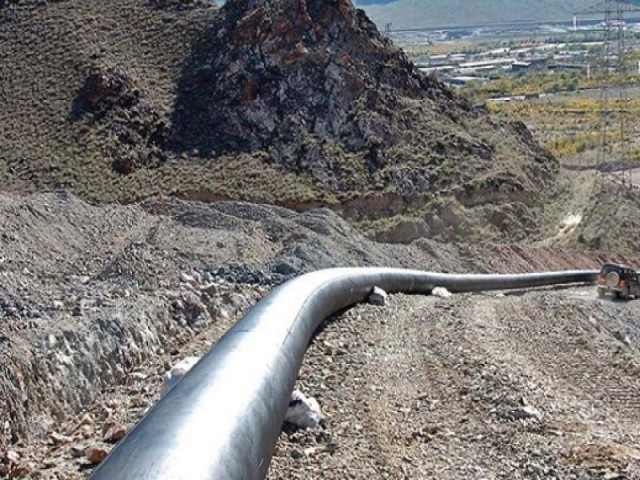Pakistan, Russia poised to sign $10b gas pipeline deals this week
Delegation will leave for Moscow on December 20 to pave way for closer ties

After signing of the MoU for the offshore pipeline, work on feasibility study will begin in an attempt to assess viability of the project. Russia is even ready to finance the study. PHOTO: REUTERS
“A Pakistani delegation will leave for Russia on December 20 to sign these deals in order to execute the two gas pipeline projects,” said a senior government official while talking to The Express Tribune.
Inter State Gas Systems (ISGS) - a state-owned company established to handle gas import matters - is working on different gas pipeline projects and its managing director and the petroleum secretary will be part of the delegation.
ISGS is also working on the $10 billion Turkmenistan, Afghanistan, Pakistan and India (Tapi) gas pipeline to connect South and Central Asia and construction work on the scheme in Pakistan will start in March next year.
Russia supports Pakistan’s bid to join elite nuclear trading club
These projects are called a game changer for Pakistan as they will not only lead to regional connectivity, but will also meet energy needs of the country.
Amid a long-running tussle with Europe and the United States over the annexation of Ukrainian region of Crimea, Russia is looking for alternative markets and wants to capitalise on the growing demand in South Asia.
Russia, which controls and manages huge gas reserves in energy-rich Iran, plans to export gas by laying an offshore pipeline through Gwadar Port to Pakistan and India, which are seen as alternative markets because Moscow fears it may lose energy consumers in Europe over the Crimea stand-off.
Russia has been a big gas exporter to European Union (EU) countries and Turkey since long and despite US anger the European bloc has continued to make imports to meet its energy needs.
Moscow receives gas from Turkmenistan and then exports it to EU states. Later, it has got gas deposits in Iran as well and is looking to gain a foothold in the markets of Pakistan and India.
Earlier, Pakistan and Russia had reached an understanding on signing the offshore gas pipeline deal during Prime Minister Shahid Khaqan Abbasi’s visit to Sochi, Russia. Now, during the upcoming trip, the two sides are poised to ink memoranda of understanding (MoUs) for the offshore pipeline and the North-South (Lahore-Karachi) LNG pipeline.
Pakistan has been experiencing gas shortages, particularly in winter, for the past many years as domestic production has stood static with new additions being offset by depleting old deposits.
In a bid to tackle the crisis, the present government kicked off LNG imports from Qatar under a 15-year agreement two and a half years ago and is bringing supplies through other sources as well.
“Such massive business deals will open a new avenue for closer diplomatic ties between Russia and Pakistan,” the senior government official commented.
NA speaker urges closer cooperation with Russia
On the other hand, Pakistan and the US are going through a critical phase in their relations in the wake of President Donald Trump’s new policy on Afghanistan, which proposes a vital role for India in this region. Pakistan has rejected the suggestion.
According to the government official, after signing of the MoU for the offshore pipeline, work on feasibility study will begin in an attempt to assess viability of the project. Russia is even ready to finance the study.
Russian gas exports touched an all-time high in 2017. According to its energy giant Gazprom, gas flows to Europe and Turkey, excluding ex-Soviet states, hit a new daily record at 621.8 million cubic metres.
Annual exports touched 179.3 billion cubic metres (bcm) in 2016, a significant jump from the previous high of 161.5 bcm in 2013 and well above the 2015 total of 158.6 bcm.
Published in The Express Tribune, December 19th, 2017.
Like Business on Facebook, follow @TribuneBiz on Twitter to stay informed and join in the conversation.


















COMMENTS
Comments are moderated and generally will be posted if they are on-topic and not abusive.
For more information, please see our Comments FAQ